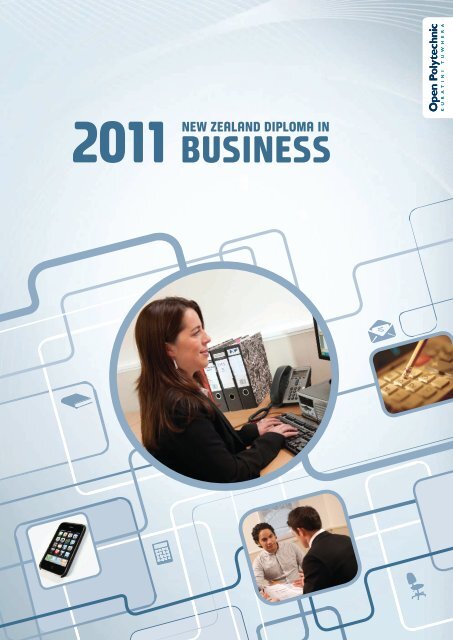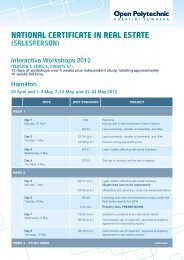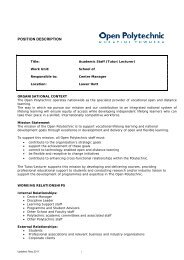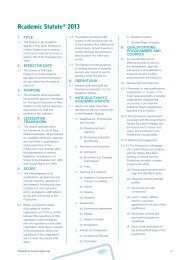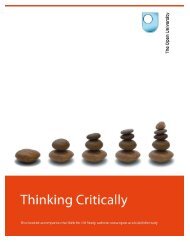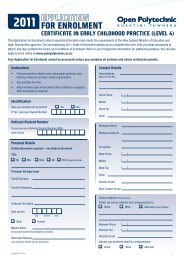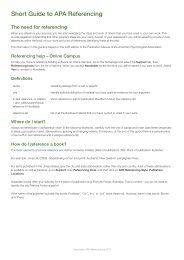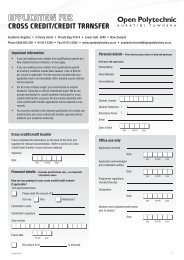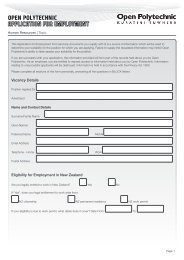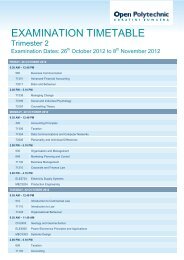BUSINESS - Open Polytechnic
BUSINESS - Open Polytechnic
BUSINESS - Open Polytechnic
You also want an ePaper? Increase the reach of your titles
YUMPU automatically turns print PDFs into web optimized ePapers that Google loves.
2011<br />
NEW ZEALAND DIPLOMA IN<br />
<strong>BUSINESS</strong>
WELCOME TO OPEN POLYTECHNIC<br />
Whether you are looking to improve your career prospects or just<br />
learn something new, we can help you achieve your goal. We<br />
specialise in open learning – learning that gives you more freedom to<br />
decide what you study and where you study.<br />
Our courses are specifically designed for delivery by distance, which<br />
means you can fit your study around your life. And just because you<br />
are learning by distance, it doesn’t mean you have to do it alone. You<br />
will have access to your tutors and lecturers by email or phone and to<br />
other students studying the same course through the Online Campus,<br />
the student support section of our website.<br />
It is our goal to make sure that you enjoy your study and that<br />
you succeed. So welcome to learning for today’s world, and<br />
congratulations on taking up the challenge of further education.<br />
Please note that all information contained in this brochure may be subject to change without notice.<br />
3
CONTENTS<br />
Key dates for 2011 2<br />
New Zealand Diploma in Business 3<br />
Qualification 3<br />
Future skills 3<br />
Qualification structure 3<br />
Other Qualifications 6<br />
<strong>Open</strong> <strong>Polytechnic</strong> qualifications 6<br />
Additional qualifications 10<br />
General Information 14<br />
Study pathways 14<br />
Assessment 14<br />
Entry requirements 15<br />
Studying online 15<br />
Study time 15<br />
Fees 15<br />
Loans, allowances & other funding 16<br />
Enrolment 16<br />
Accelerated assessment 16<br />
Credit transfer 16<br />
New Zealand Diploma in Business version two<br />
transition arrangements 16<br />
Learning support 16<br />
Appendix 1: Cross-credit to Bachelor of Business 24<br />
Appendix 2: Credit transfer schedule of NZIM<br />
qualifications to New Zealand Diploma in Business<br />
Version two 25<br />
Appendix 3: Credit transfer to New Zealand<br />
Diploma in Business 26<br />
Appendix 4: New Zealand Diploma in Business<br />
Version two – Transition arrangements 29<br />
Appendix 5: Computer requirements 30<br />
Appendix 6: Definitions 31<br />
Contact us 33<br />
Other useful contact details 33<br />
Further study 17<br />
Course information 18<br />
Course availability 18<br />
Examination timetable 2011 19<br />
Course outlines 20<br />
1
KEY DATES FOR 2011<br />
Enrolments open for 2011 1 November 2010<br />
TRIMESTER 1<br />
Enrolments close for Trimester 1 14 February 2011<br />
Graduation ceremony applications close 28 February 2011<br />
Trimester 1 begins 28 February 2011<br />
Last day for withdrawing (with refund) 27 March 2011<br />
Last day for withdrawing (no refund) 29 May 2011<br />
Trimester 1 final exams 17–24 June 2011<br />
TRIMESTER 2<br />
Enrolments close for Trimester 2 1 July 2011<br />
Trimester 2 begins 11 July 2011<br />
Last day for withdrawing (with refund) 7 August 2011<br />
Last day for withdrawing (no refund) 9 October 2011<br />
Trimester 2 final exams 28 October–4 November 2011<br />
TRIMESTER 3<br />
Enrolments close for Trimester 3 28 October 2011<br />
Enrolments open for 2012 1 November 2011<br />
Trimester 3 begins 7 November 2011<br />
Last day for withdrawing (with refund) 4 December 2011<br />
Last day for withdrawing (no refund) 29 January 2012<br />
Trimester 3 final exams 22–24 February 2012<br />
Note: All fees must be paid before the trimester starts so we can confirm<br />
your enrolment and send you your course materials. If you are planning to<br />
pay your fees by student loan you need to apply to StudyLink at least 4<br />
weeks before the start of the trimester.<br />
2
NEW ZEALAND DIPLOMA IN <strong>BUSINESS</strong><br />
Qualification code: NC5121<br />
Levels: 4–6<br />
QUALIFICATION<br />
The New Zealand Diploma in Business is a nationally recognised, broad-based business qualification which equips you for a<br />
wide range of business careers or for further study in accounting, banking and finance, and management. It is recognised by<br />
a number of professional bodies.<br />
The Diploma is made up of 12 courses, and <strong>Open</strong> <strong>Polytechnic</strong> offers a range of these courses over three trimesters each<br />
year.<br />
The information in this brochure relates to version two of the New Zealand Diploma in Business. For information on version<br />
one, visit our website www.openpolytechnic.ac.nz and search for NZDipBus.<br />
FUTURE SKILLS<br />
When you have completed the New Zealand Diploma in Business you will have:<br />
· Business skills<br />
· Interpersonal and communication skills<br />
· Critical problem-solving skills<br />
· Decision-making skills<br />
· The ability to recognise ethical and cultural issues<br />
· The skills to work independently and within a team environment<br />
· Research abilities and knowledge to undertake further study and professional development.<br />
You can find the full graduate profile and more information on the NZQA website. Go to: www.nzqa.govt.nz<br />
QUALIFICATION STRUCTURE<br />
You will be awarded a New Zealand Diploma in Business (Level 6) when you have passed 240 credits (12 courses), with at<br />
least 80 credits (four courses) at Level 6 and no more than 60 credits (three courses) at Level 4. Your credits must include at<br />
least six of the core courses and six of the electives. You may use the seventh core course as an elective.<br />
Core courses<br />
You must do at least six of these – the seventh can be done as an elective.<br />
COURSE<br />
NUMBER<br />
TITLE LEVEL CREDITS<br />
400 Accounting Principles 4 20<br />
510 Introduction to Commercial Law 5 20<br />
520 The Economic Environment 5 20<br />
530 Organisation & Management 5 20<br />
541 Fundamentals of Marketing 5 20<br />
550 Business Computing 5 20<br />
560 Business Communication 5 20<br />
3
Elective courses<br />
You must do at least six of these, five if your sixth elective is chosen from the core course list. At least four must be at Level<br />
6 – ie from courses with numbers in the 600 series.<br />
COURSE<br />
NUMBER<br />
TITLE LEVEL CREDIT<br />
430 Quantitative Business Methods 4 20<br />
435 Fundamentals of Small Business 4 20<br />
501 Accounting Practices 5 20<br />
570 Introduction to Banking & Financial Services 5 20<br />
601 Financial Accounting 6 20<br />
602 Management Accounting 6 20<br />
603 Business Finance 6 20<br />
606 Taxation 6 20<br />
630 Leadership 6 20<br />
631 Strategic Planning for Small Business 6 20<br />
632 Operations Management 6 20<br />
633 Human Resource Management 6 20<br />
635 Employment Relations 6 20<br />
636 Applied Management 6 20<br />
642* Marketing Research 6 20<br />
644 Buyer Behaviour & Communication Strategies 6 20<br />
648* Marketing Planning & Control 6 20<br />
650 Applied Computing 6 20<br />
652 Systems Development Project 6 20<br />
655 Information Systems Management 6 20<br />
670* Advanced Banking 6 20<br />
675* Lending & Securities 6 20<br />
676 International Trade & Finance 6 20<br />
696 Investment & Insurance 6 20<br />
* Not available 2011<br />
4
TO HELP PLAN YOUR STUDY, FILL IN THE COURSE PLANNER BELOW<br />
Level 6 Minimum of four courses<br />
Elective<br />
Elective<br />
Elective<br />
Elective<br />
Level 4/5 Maximum of eight courses<br />
Core Core Core Elective<br />
Core Core Core Elective<br />
5
OTHER QUALIFICATIONS<br />
On the way through your study, you may become eligible for an <strong>Open</strong> <strong>Polytechnic</strong> diploma, another qualification or a<br />
professional membership.<br />
<strong>Open</strong> <strong>Polytechnic</strong> qualifications<br />
<strong>Open</strong> <strong>Polytechnic</strong> diplomas are made up of six New Zealand Diploma in Business courses and you can credit transfer a<br />
maximum of three courses from another institution or qualification. You should still enrol in the New Zealand Diploma in<br />
Business qualification (code NC5121).<br />
The diplomas available are:<br />
· <strong>Open</strong> <strong>Polytechnic</strong> Diploma in Accounting<br />
· <strong>Open</strong> <strong>Polytechnic</strong> Diploma in Banking<br />
· <strong>Open</strong> <strong>Polytechnic</strong> Diploma in Human Resources<br />
· <strong>Open</strong> <strong>Polytechnic</strong> Diploma in Information Systems<br />
· <strong>Open</strong> <strong>Polytechnic</strong> Diploma in Marketing<br />
· <strong>Open</strong> <strong>Polytechnic</strong> Diploma in Small Business.<br />
Note: If you have completed one of the above diplomas you can study another six courses and gain the full New<br />
Zealand Diploma in Business. An unspecified credit is not permitted for these diplomas.<br />
For all of the following qualifications, courses marked with * are core New Zealand Diploma in Business courses and courses<br />
marked ** have prerequisites.<br />
DIPLOMA IN ACCOUNTING (DIPACCY)<br />
QUALIFICATION STRUCTURE<br />
COURSE<br />
NUMBER<br />
TITLE LEVEL CREDITS<br />
FOUR COMPULSORY COURSES<br />
400 Accounting Principles* 4 20<br />
501 Accounting Practices 5 20<br />
601 Financial Accounting** 6 20<br />
602 Management Accounting** 6 20<br />
PLUS ONE OF:<br />
510 Introduction to Commercial Law* 5 20<br />
520 The Economic Environment* 5 20<br />
530 Organisation & Management* 5 20<br />
550 Business Computing* 5 20<br />
560 Business Communication* 5 20<br />
PLUS ONE OF:<br />
603 Business Finance** 6 20<br />
606 Taxation** 6 20<br />
6
DIPLOMA IN BANKING (DIPBANK)<br />
QUALIFICATION STRUCTURE<br />
COURSE<br />
NUMBER<br />
TITLE LEVEL CREDITS<br />
ALL COURSES COMPULSORY<br />
400 Accounting Principles* 4 20<br />
570 Introduction to Banking & Financial Services 5 20<br />
670* Advanced Banking** 6 20<br />
675* Lending & Securities** 6 20<br />
676 International Trade & Finance 6 20<br />
696 Investment & Insurance 6 20<br />
* Not available 2011<br />
DIPLOMA IN HUMAN RESOURCES (DIPHR)<br />
QUALIFICATION STRUCTURE<br />
COURSE<br />
NUMBER<br />
TITLE LEVEL CREDITS<br />
FOUR COMPULSORY COURSES<br />
510 Introduction to Commercial Law* 5 20<br />
530 Organisation & Management* 5 20<br />
633 Human Resource Management** 6 20<br />
635 Employment Relations** 6 20<br />
PLUS TWO OF:<br />
550 Business Computing* 5 20<br />
560 Business Communication* 5 20<br />
636 Applied Management** 6 20<br />
7
DIPLOMA IN INFORMATION SYSTEMS (DIPIS)<br />
QUALIFICATION STRUCTURE<br />
COURSE<br />
NUMBER<br />
TITLE LEVEL CREDITS<br />
FOUR COMPULSORY COURSES<br />
550 Business Computing* 5 20<br />
650 Applied Computing** 6 20<br />
652 Systems Development Project** 6 20<br />
655 Information Systems Management** 6 20<br />
PLUS TWO OF:<br />
400 Accounting Principles* 4 20<br />
430 Quantitative Business Methods* 4 20<br />
501 Accounting Practices 5 20<br />
510 Introduction to Commercial Law* 5 20<br />
520 The Economic Environment* 5 20<br />
530 Organisation & Management* 5 20<br />
560 Business Communication* 5 20<br />
DIPLOMA IN MARKETING (DIPMKTG)<br />
QUALIFICATION STRUCTURE<br />
COURSE<br />
NUMBER<br />
TITLE LEVEL CREDITS<br />
FOUR COMPULSORY COURSES<br />
541 Fundamentals of Marketing 5 20<br />
642* Marketing Research** 6 20<br />
644 Buyer Behaviour & Communication Strategies** 6 20<br />
648* Marketing Planning & Control** 6 20<br />
PLUS TWO OF:<br />
400 Accounting Principles* 4 20<br />
430 Quantitative Business Methods 4 20<br />
435 Fundamentals of Small Business 4 20<br />
520 The Economic Environment* 5 20<br />
530 Organisation & Management* 5 20<br />
560 Business Communication* 5 20<br />
630 Leadership** 6 20<br />
676 International Trade & Finance 6 20<br />
* Not available 2011<br />
8
DIPLOMA IN SMALL <strong>BUSINESS</strong> (DIPSMBUS)<br />
QUALIFICATION STRUCTURE<br />
COURSE<br />
NUMBER<br />
TITLE LEVEL CREDITS<br />
FIVE COMPULSORY COURSES<br />
400 Accounting Principles* 4 20<br />
435 Fundamentals of Small Business 4 20<br />
510 Introduction to Commercial Law* 5 20<br />
541 Fundamentals of Marketing* 5 20<br />
631 Strategic Planning for Small Business** 6 20<br />
PLUS ONE OF:<br />
603 Business Finance** 6 20<br />
606 Taxation** 6 20<br />
633 Human Resource Management** 6 20<br />
9
Additional qualifications<br />
ACCOUNTING TECHNICIANS<br />
Accounting technicians are professional support people who work in accounting and finance organisations and in other<br />
business and commercial organisations. They are skilled in the practical aspects of accounting and management information<br />
systems and related technology.<br />
The New Zealand Diploma in Business with an accounting specialisation is the academic component for membership<br />
requirements of the College of Accounting Technicians of the New Zealand Institute of Chartered Accountants (NZICA)<br />
qualification.<br />
QUALIFICATION STRUCTURE<br />
*Core New Zealand Diploma in Business courses<br />
COURSE<br />
NUMBER<br />
**Course has prerequisites<br />
TITLE LEVEL CREDITS<br />
NINE COMPULSORY COURSES<br />
400 Accounting Principles* 4 20<br />
501 Accounting Practices 5 20<br />
510 Introduction to Commercial Law* 5 20<br />
520 The Economic Environment* 5 20<br />
530 Organisation & Management* 5 20<br />
560 Business Communication* 5 20<br />
550 Business Computing 5 20<br />
601 Financial Accounting** 6 20<br />
602 Management Accounting** 6 20<br />
PLUS TWO OF:<br />
603 Business Finance** 6 20<br />
605 Internal Auditing (not offered by <strong>Open</strong> <strong>Polytechnic</strong>) 6 20<br />
606 Taxation** 6 20<br />
PLUS ONE FURTHER DIPLOMA OF <strong>BUSINESS</strong> COURSE.<br />
Other requirements for membership of the College of Accounting Technicians are:<br />
· 2 years full-time relevant work experience, one year of which must be under the guidance of an Institute registered mentor<br />
· A pass in the Foundation Programme.<br />
To find out more contact:<br />
New Zealand Institute of Chartered Accountants<br />
PO Box 11342<br />
Wellington 6034<br />
Phone: 04 474 7840<br />
Email: registry@nzica.com<br />
Website: www.nzica.com<br />
To become a chartered accountant, you need to complete an approved degree, such as <strong>Open</strong> <strong>Polytechnic</strong>’s Bachelor<br />
of Business. You can cross-credit courses from your New Zealand Diploma in Business to the Bachelor of Business (see<br />
Appendix 1). For more information contact us. See the last page of this brochure for contact details.<br />
10
NZIM DIPLOMA IN MANAGEMENT (DIPMGT)<br />
QUALIFICATION STRUCTURE<br />
If you have passed the following New Zealand Diploma in Business courses, you are eligible for the New Zealand Institute of<br />
Management’s (NZIM) Diploma in Management.<br />
COURSE<br />
NUMBER<br />
TITLE LEVEL CREDITS<br />
FOUR COMPULSORY COURSES<br />
530 Organisation & Management* 5 20<br />
560 Business Communication* 5 20<br />
630 Leadership** 6 20<br />
636 Applied Management 6 20<br />
PLUS TWO OF:<br />
400<br />
520<br />
Accounting Principles* OR<br />
The Economic Environment*<br />
4<br />
5<br />
20<br />
20<br />
430 Quantitative Business Methods 4 20<br />
435 Fundamentals of Small Business 4 20<br />
510 Introduction to Commercial Law* 5 20<br />
541 Fundamentals of Marketing* 5 20<br />
550 Business Computing* 5 20<br />
632 Operations Management** 6 20<br />
633 Human Resource Management** 6 20<br />
You can also study for this diploma under our Bachelor of Business qualification. For more information contact us. See the<br />
last page of this brochure for contact details.<br />
11
NZIM DIPLOMA IN MANAGEMENT (ADVANCED) – DIPMGT (ADVANCED)<br />
QUALIFICATION STRUCTURE<br />
This diploma builds on the Diploma in Management (DipMgt).<br />
COURSE<br />
NUMBER<br />
TITLE LEVEL CREDITS<br />
TWO COMPULSORY COURSES<br />
630 Leadership** 6 20<br />
636 Applied Management 6 20<br />
PLUS:<br />
652 Systems Development Project** 6 20<br />
PLUS FIVE OF:<br />
602<br />
603<br />
Management Accounting** OR<br />
Business Finance**<br />
6<br />
6<br />
20<br />
20<br />
631 Strategic Planning for Small Business** 6 20<br />
632 Operations Management** 6 20<br />
633 Human Resource Management** 6 20<br />
635 Employment Relations** 6 20<br />
642* Marketing Research** 6 20<br />
648* Marketing Planning & Control** 6 20<br />
650<br />
655<br />
Applied Computing** OR<br />
Information Systems Management**<br />
6<br />
6<br />
20<br />
20<br />
676 International Trade & Finance 6 20<br />
* Not available 2011<br />
Note: To be awarded the DipMgt or DipMgt (Advanced) you will need to register your results directly with NZIM.<br />
Registration forms and details of registration fees are available from NZIM and are in the NZIM programme booklet<br />
Ascent of Management.<br />
To find out more, contact:<br />
New Zealand Institute of Management<br />
Freepost 878<br />
PO Box 67<br />
Wellington 6142<br />
Phone: 04 473 0470<br />
Fax: 04 473 0479<br />
Email: national_office@nzim.co.nz<br />
12
PROFESSIONAL MEMBERSHIP – BANKING & FINANCE<br />
The New Zealand Diploma in Business qualification meets the academic requirements for Associate Membership of the<br />
Financial Services Institute of Australasia (Finsia) – AFin.<br />
To qualify for associate membership of Finsia you must hold either the <strong>Open</strong> <strong>Polytechnic</strong> Diploma in Banking (see DipBank<br />
page 7) or a New Zealand Diploma in Business. You are not required to have studied banking papers within the New Zealand<br />
Diploma in Business to qualify.<br />
In either case you need to be a member of Finsia to obtain the AFin post nominal.<br />
To find out more contact:<br />
Financial Services Institute of Australasia – Wellington office<br />
Phone: 04 473 5069<br />
Fax: 04 499 1990<br />
Email: members.nz@finsia.com<br />
Website: www.finsia.com<br />
13
GENERAL INFORMATION<br />
Study pathways<br />
Planning a pathway through your qualification will help you<br />
to make sure you have done courses in the best order. It<br />
will help you make sure you have done any prerequisites<br />
before enrolling in courses, and that you have taken the<br />
availability of courses into account.<br />
If you want to enrol in a course with prerequisites, and you<br />
did the prerequisite with another provider, you will need to<br />
send us evidence that you have passed it before we can<br />
enrol you.<br />
We recommend you start with one course if you plan to<br />
work and study at the same time. Full-time students may<br />
only enrol in three courses per trimester, part-time students<br />
may only enrol in two.<br />
Remember to check that the courses you want to study<br />
are available in the trimester you plan to take them, by<br />
looking in the Course availability section on page 18 of<br />
this brochure. Also check the Examinations timetable on<br />
page 19 to make sure your courses don’t have clashing<br />
examination dates.<br />
Assessment<br />
We measure your progress and determine whether you<br />
have achieved the learning outcomes of your course<br />
through assessments such as essays, reports, projects,<br />
and examinations.<br />
There are two types of assessment:<br />
summative assessment, which counts towards your final<br />
result.<br />
formative assessment, which involves activities and<br />
feedback designed to improve learning. This is not used to<br />
decide your final result.<br />
Some courses also have a 3-hour final examination. To be<br />
eligible to sit the final examination you must finish all the<br />
summative in-course assessments by their due date.<br />
To pass each course, you must:<br />
· Submit all your summative in-course assessments by<br />
their due date<br />
· Score at least 40% in the final examination (if the course<br />
has a final examination) and<br />
· Receive a final mark of at least 50% of the total possible<br />
marks for the course.<br />
Assessment varies for each course. Full details will be in<br />
the course information, which is sent to you when you<br />
enrol.<br />
ONLINE ASSESSMENT<br />
One of the in-course assessments in the courses listed<br />
below will be an online real-time assessment.<br />
This means you do the assessment online and get your<br />
mark and feedback electronically. So you will get almost<br />
instantaneous feedback. Full details will be provided in your<br />
course information, and you will also have access to a trial<br />
online assessment so you can see how it works.<br />
If you enrol in one of these courses you will need Internet<br />
access.<br />
The courses are:<br />
400 Accounting Principles<br />
501 Accounting Practices<br />
530 Organisation & Management<br />
541 Fundamentals of Marketing<br />
550 Business Computing.<br />
EXAMINATIONS<br />
<strong>Open</strong> <strong>Polytechnic</strong> has examination venues throughout<br />
New Zealand. You will be allocated a venue closest to your<br />
postal address. Before you choose the courses you want<br />
to enrol in, make sure you can attend the examination,<br />
because examination times and dates cannot be changed.<br />
Sitting examinations outside New Zealand<br />
If you are, or will be, living overseas when the examination<br />
time comes, you will need to arrange a suitable<br />
examination venue and an appropriate supervisor.<br />
We will contact you 8 weeks before the examination to help<br />
you make these arrangements.<br />
Any costs relating to the overseas venue and supervision<br />
will be your responsibility, including the costs of your<br />
supervisor returning your completed examination paper by<br />
courier.<br />
Special assistance for examinations<br />
If you need special arrangements to enable you to sit an<br />
examination, we may be able to help. Fill in and return the<br />
Application for Special Assistance form which is in the back<br />
of your Student Handbook. We will need your application<br />
form at least 6 weeks before your examination. The more<br />
notice we have, the more likely that we will be able to<br />
help you. If you would like to discuss your needs you can<br />
contact exams@openpolytechnic.ac.nz<br />
14
Entry requirements<br />
UNDER 20 YEARS<br />
Students under 20 years of age must have:<br />
· A minimum of 14 numeracy credits at Level 1 or higher in<br />
mathematics or pängarau on the National Qualifications<br />
Framework; and<br />
· 50 credits at Level 2 or above, with at least 12 credits<br />
in each of three subjects including a minimum of eight<br />
literacy credits at Level 2 or higher in English or te reo<br />
Mäori; four credits must be in reading and four credits<br />
must be in writing. The literacy credits will be selected<br />
from a schedule of approved achievement standards and<br />
unit standards<br />
Or an equivalent to both of the above.<br />
20 YEARS AND OVER<br />
There are no formal entry requirements for students 20<br />
years of age and over. However, if you do not have a<br />
qualification at Sixth Form level, we may ask you to show<br />
that you have relevant work experience before accepting<br />
you into the qualification.<br />
ENGLISH LANGUAGE<br />
Because we teach in English, if English is your second<br />
language you must supply one of the following:<br />
· A minimum score of 6.0 (academic) in IELTS (with no<br />
individual band score less than 5.5)<br />
· Passes in other recognised English proficiency tests,<br />
subject to the Academic Registrar’s discretion<br />
· Evidence of successful study at a tertiary level in English.<br />
You will need to be able to read and write well in English so<br />
you can write your assessments in English and understand<br />
written course materials.<br />
If you choose courses which have workshops and practical<br />
and/or on-the-job assessments, you will need to speak<br />
English fluently, and understand spoken English easily.<br />
Even if you choose mathematical and scientific courses,<br />
you will still need to understand and write well in English.<br />
Studying online<br />
You do not need to have any particular technical or<br />
computer skills to study online, but you will need to be<br />
comfortable using a computer.<br />
You will need access to a computer with Internet access<br />
because:<br />
· Some courses have on-line assessment<br />
· It will mean you can use the Online Campus discussion<br />
forums<br />
· Important information such as newsletters and<br />
assessment feedback are sent electronically.<br />
See Appendix 5 for more information and the technical<br />
requirements.<br />
WEB-ENHANCED COURSES<br />
510 Introduction to Commercial Law and 520 The<br />
Economic Environment are web-enhanced courses, which<br />
means you will need to access some course materials and<br />
resources online and will have to take part in some online<br />
activities.<br />
Study time<br />
All courses have a credit value. This helps you work out<br />
how much study time you will need. Allow about 12 hours<br />
of study per credit. To determine how many hours of study<br />
this means each week, divide the total study hours by the<br />
number of weeks in the enrolment period.<br />
If you are studying full time you should finish the diploma<br />
in about 2 years. If you are studying part time it will take<br />
3 years or more.<br />
Fees<br />
A full list of fees is available on our website<br />
www.openpolytechnic.ac.nz<br />
SET TEXTS<br />
You will need to buy set texts for many courses. These are<br />
an additional cost and are not included in your course fees.<br />
A full list of set texts can be found on our website.<br />
Texts can be bought online. Go to www.vicbooks.co.nz<br />
and click on the <strong>Open</strong> <strong>Polytechnic</strong> link.<br />
Second-hand textbooks<br />
You can buy and sell second-hand textbooks through the<br />
Online Campus. Go to:<br />
http://campus.openpolytechnic.ac.nz click on Explore<br />
Resources then Second-hand text books.<br />
Be careful with second-hand books and make sure you<br />
are buying the right edition. An out-of-date edition may be<br />
cheap but it will probably have out-of-date information.<br />
Set texts are not available from the <strong>Open</strong> <strong>Polytechnic</strong><br />
library.<br />
· Your in-course assessments need to be word-processed<br />
· Many courses require computers as an integral part of<br />
the course<br />
15
Loans, allowances & other funding<br />
Student loans and allowances are administered by<br />
StudyLink. Make sure you apply for a loan at least 4 weeks<br />
before the trimester starts. We cannot confirm your<br />
enrolment or send your course materials until your fees<br />
have been paid.<br />
For information on loans and allowances contact<br />
StudyLink. See the last page of this brochure for contact<br />
details.<br />
FINANCIAL ASSISTANCE<br />
We have a fund to help students who are in financial need<br />
and have no other options for financial support. Conditions<br />
apply. Contact us for more information. See the last page<br />
of this brochure for contact details.<br />
We also offer a range of scholarships to support students.<br />
Go to: www.openpolytechnic.ac.nz for more details.<br />
Enrolment<br />
To enrol, please complete the enclosed Application for<br />
Enrolment form and send it to us in the enclosed, replypaid<br />
envelope. Alternatively, you can enrol online for most<br />
courses by going to our website.<br />
If you are a returning student, you can re-enrol by calling<br />
us. See the last page of this brochure for contact details.<br />
Please check the Course availability section in this<br />
brochure to make sure the course you want to study<br />
is available when you want to study it. And check the<br />
Key dates section at the beginning of this brochure for<br />
enrolment deadlines for each trimester.<br />
Accelerated assessment<br />
Accelerated assessment is the way in which we recognise<br />
self-learning and the experience you have gained in the<br />
workplace. If you already have relevant work experience<br />
that you think will exempt you from having to do some<br />
parts of this qualification you can apply for accelerated<br />
assessment. You will need to provide evidence that you<br />
have already met the learning outcomes of the course<br />
you want to be exempted from. The evidence could be<br />
testimonials or references from appropriately experienced<br />
referees.<br />
You can apply for accelerated assessment after you have<br />
enrolled. The Student Handbook, which we will send you<br />
when you enrol, and your course material will have more<br />
information.<br />
If you apply and are unsuccessful you can still study the<br />
course and receive credit for it. Contact the Course Leader<br />
if you need further information. See the last page of this<br />
brochure for contact details.<br />
You can apply for accelerated assessment in:<br />
400 Accounting Principles<br />
501 Accounting Practices<br />
530 Organisation & Management<br />
550 Business Computing<br />
560 Business Communication<br />
606 Taxation<br />
636 Applied Management.<br />
Credit transfer<br />
If you already have passed courses, through either us or<br />
another tertiary provider, that you think will exempt you<br />
from having to do some parts of a qualification you can<br />
apply for credit transfer. You will need to provide evidence<br />
that you have already met the learning outcomes of the<br />
course you want credit for.<br />
You can apply for credit transfer after you have enrolled.<br />
The Student Handbook, which we will send you when you<br />
enrol, has more information.<br />
New Zealand Diploma in<br />
Business version two transition<br />
arrangements<br />
The transition arrangements given in Appendix 4 also<br />
apply to other qualifications which include New Zealand<br />
Diploma in Business courses.<br />
Learning support<br />
ACADEMIC PROGRESS<br />
We are committed to helping you to achieve your goals. If<br />
you feel you are struggling please contact us for advice and<br />
help. See the last page of this brochure for contact details.<br />
YOUR LECTURER<br />
You will have a lecturer for each course you study. Your<br />
lecturer is there to help you through the course work, make<br />
sure you have understood the study material and check<br />
your progress. You can contact them on our freephone or<br />
by email, fax or letter. Their contact details will be in the<br />
information we send you when you enrol.<br />
STUDENT HANDBOOK<br />
The Student Handbook has important and useful<br />
information about studying with us. We recommend you<br />
read this. We will send you a copy after your enrolment<br />
is confirmed. It is also available to view on the Online<br />
Campus.<br />
16
STUDY HELP<br />
When you enrol you will be sent a copy of our study guide<br />
StudyWise.<br />
The Learning Support section of our website also has<br />
information about the study support and resources we<br />
offer.<br />
ONLINE CAMPUS<br />
The Online Campus is the area of our website where you<br />
can:<br />
· Access and submit assessments<br />
· Link to web pages specific to your course, including<br />
frequently asked questions (FAQs), assessment hints,<br />
web resources, staff information and sometimes online<br />
quizzes and tutorials<br />
· Communicate with other students in your course, and<br />
with your lecturer or tutor<br />
· Access the library<br />
· Download past exam papers.<br />
LIBRARY<br />
We provide a library service for students. There is no<br />
additional fee for using it. The library service provides:<br />
· Online resources<br />
· Guides on how to search for information<br />
· A distance lending service with free and fast delivery<br />
· Information about study techniques.<br />
You will find more information in the Student Handbook.<br />
Further study<br />
The New Zealand Diploma in Business is a stepping stone<br />
to higher qualifications such as the <strong>Open</strong> <strong>Polytechnic</strong>’s<br />
Bachelor of Business or degrees from other polytechnics<br />
or universities. See Appendix 1 for information on crosscrediting<br />
your New Zealand Diploma in Business to the<br />
<strong>Open</strong> <strong>Polytechnic</strong>’s Bachelor of Business.<br />
17
COURSE INFORMATION<br />
Course availability<br />
PLEASE NOTE THESE CAN BE SUBJECT TO CHANGE<br />
COURSE<br />
CODE<br />
COURSES – VERSION TWO<br />
TRIMESTER<br />
AVAILABILITY<br />
2011<br />
PREREQUISITE<br />
TEXT<br />
BOOKS<br />
EXAM<br />
1 2 3<br />
400 Accounting Principles** ✓ ✓ ✓ ✓ ✓<br />
430 Quantitative Business Methods ✓ ✓ ✓ ✓<br />
435 Fundamentals of Small Business ✓ ✓<br />
501 Accounting Practices** ✓ ✓ ✓ 400 R ✓ ✓<br />
510 Introduction to Commercial Law ✓ ✓ ✓ ✓ ✓<br />
520 The Economic Environment ✓ ✓ ✓<br />
530 Organisation & Management** ✓ ✓ 560 R ✓ ✓<br />
541 Fundamentals of Marketing** ✓ ✓ ✓ ✓<br />
550 Business Computing** ✓ ✓ ✓ ✓<br />
560 Business Communication ✓ ✓ ✓ ✓ ✓<br />
570 Introduction to Banking & Financial<br />
Services<br />
✓<br />
✓<br />
601 Financial Accounting ✓ 400 and 501 ✓ ✓<br />
602 Management Accounting ✓ 400 and 501 ✓ ✓<br />
603 Business Finance ✓ 400, 430 R ✓ ✓<br />
606 Taxation ✓ 400 ✓ ✓<br />
630 Leadership ✓ 530 ✓<br />
631 Strategic Planning for Small Business ✓ ✓ 435<br />
632 Operation Management ✓ 530 ✓ ✓<br />
633 Human Resource Management ✓ 530,510 R, 520 R ✓ ✓<br />
635 Employment Relations ✓ 530,510 R, 520 R ✓ ✓<br />
636 Applied Management ✓ 530 R<br />
642 Marketing Research Not available 2011 541, 430 R ✓ ✓<br />
644 Buyer Behaviour & Communication<br />
Strategies<br />
✓ 541, 560 R ✓<br />
648 Marketing Planning & Control Not available 2011 541 ✓<br />
650 Applied Computing ✓ ✓ 550 ✓<br />
652 Systems Development Project ✓ 550, 650 R ✓<br />
655 Information Systems Management ✓ 550<br />
670 Advanced Banking Not available 2011 400 and 570 ✓<br />
675 Lending and Securities Not available 2011 400, 570 R ✓<br />
676 International Trade & Finance ✓ 570 R ✓<br />
18<br />
696 Investment & Insurance ✓ ✓<br />
R = recommended
Examination timetable 2011<br />
Note: The following courses are internally assessed:<br />
435 Fundamentals of Small Business<br />
520 The Economic Environment<br />
550 Business Computing<br />
630 Leadership<br />
631 Strategic Planning for Small Business<br />
636 Applied Management<br />
650 Applied Computing<br />
652 Systems Development Project<br />
655 Information Systems Management.<br />
TRIMESTER 1<br />
MORNING (9.30 AM –<br />
12.40 PM)<br />
560 Business<br />
Communication<br />
TRIMESTER 2<br />
AFTERNOON (2.00 PM –<br />
5.10 PM)<br />
FRIDAY 28 OCTOBER 2011<br />
601 Financial Accounting<br />
MONDAY 31 OCTOBER 2011<br />
400 Accounting Principles 530 Organisation and<br />
Management<br />
510 Introduction to<br />
Commercial Law<br />
TUESDAY 1 NOVEMBER 2011<br />
WEDNESDAY 2 NOVEMBER 2011<br />
MORNING (9.30 AM –<br />
12.40 PM)<br />
AFTERNOON (2.00 PM –<br />
5.10 PM)<br />
633 Human Resource<br />
Management<br />
606 Taxation<br />
560 Business<br />
Communication<br />
400 Accounting Principles<br />
603 Business Finance<br />
510 Introduction to<br />
Commercial Law<br />
602 Management<br />
Accounting<br />
FRIDAY 17TH JUNE 2011<br />
530 Organisation and<br />
Management<br />
570 Introduction to<br />
Banking and Financial<br />
Services<br />
MONDAY 20TH JUNE 2011<br />
430 Quantitative Business<br />
Methods<br />
635 Employment<br />
Relations<br />
TUESDAY 21ST JUNE 2011<br />
541 Fundamentals of<br />
Marketing<br />
WEDNESDAY 22ND JUNE 2011<br />
676 International Trade<br />
and Finance<br />
FRIDAY 24TH JUNE 2011<br />
501 Accounting Practices<br />
696 Investment and<br />
Insurance<br />
541 Fundamentals of<br />
Marketing<br />
THURSDAY 3 NOVEMBER 2011<br />
501 Accounting<br />
Practices<br />
644 Buyer Behaviour &<br />
Communication Strategies<br />
FRIDAY 4 NOVEMBER 2011<br />
430 Quantitative Business<br />
Methods<br />
TRIMESTER 3 – 2010/2011 (SUMMER TRIMESTER)<br />
MORNING (9.30 AM –<br />
12.40 PM)<br />
AFTERNOON (2.00 PM –<br />
5.10 PM)<br />
WEDNESDAY 22 FEBRUARY 2012<br />
400 Accounting Principles 560 Business<br />
Communication<br />
632 Operations<br />
Management<br />
510 Introduction to<br />
Commercial Law<br />
THURSDAY 23 FEBRUARY 2012<br />
430 Quantitative Business<br />
Methods<br />
501 Accounting Practices<br />
FRIDAY 24 FEBRUARY 2012<br />
19
Course outlines<br />
You can find a full description of New Zealand Diploma in<br />
Business course prescriptions on the NZQA website.<br />
Go to www.nzqa.govt.nz<br />
400 ACCOUNTING PRINCIPLES<br />
Core course<br />
You will understand financial statements and reports and<br />
be able to analyse and interpret business performance for<br />
sole traders and small companies.<br />
Assessment: 40% in-course (includes online assessment),<br />
60% examination.<br />
Requirements: Set text, Internet access (see Appendix 5).<br />
430 QUANTITATIVE <strong>BUSINESS</strong> METHODS<br />
You will learn about the concepts and methods of data<br />
analysis, statistical inference and financial mathematics.<br />
Assessment: 50% in-course, 50% examination.<br />
Requirements: Internet access, Excel (see Appendix 5).<br />
Recommendation: If you have not studied maths for some<br />
time, or if you did not study at Year 12 level, we strongly<br />
recommend that you do 4029 Introductory Mathematics<br />
for Statistics before enrolling in 430 Quantitative Business<br />
Methods.<br />
435 FUNDAMENTALS OF SMALL <strong>BUSINESS</strong><br />
You will learn about the characteristics, options and<br />
operation of small business in New Zealand.<br />
Assessment: 100% in-course.<br />
510 INTRODUCTION TO COMMERCIAL LAW<br />
(WEB-ENHANCED)<br />
Core course<br />
You will learn about commercial law and be able to apply<br />
legal reasoning.<br />
Assessment: 50% in-course, 50% examination.<br />
Requirements: Set text, Internet access (see Appendix 5).<br />
520 THE ECONOMIC ENVIRONMENT<br />
(WEB-ENHANCED)<br />
Core course<br />
You will apply elements of economic theory to<br />
contemporary business issues.<br />
Assessment: 100% in-course.<br />
Requirements: Set text, Internet access (see Appendix 5).<br />
530 ORGANISATION & MANAGEMENT<br />
Core course<br />
You will understand what influences management and<br />
organisations.<br />
Assessment: 60% in-course (includes online assessment),<br />
40% examination.<br />
Requirements: Set text, Internet access (see Appendix 5).<br />
Recommendation: We recommend you enrol in<br />
560 Business Communication before studying<br />
530 Organisation & Management, or that you study both<br />
courses in the same trimester.<br />
501 ACCOUNTING PRACTICES<br />
541 FUNDAMENTALS OF MARKETING<br />
You will record and process financial transactions and<br />
prepare financial statements and cash budgets for entities,<br />
in accordance with current accounting practices.<br />
Assessment: 40% in-course (includes online assessment),<br />
60% examination.<br />
Requirements: Set text, Internet access (see Appendix 5),<br />
knowledge of spreadsheets and access to a spreadsheet<br />
programme, Mind Your Own Business (MYOB) Accounting<br />
Plus Software (Education version available from<br />
<strong>Open</strong> <strong>Polytechnic</strong> for $30).<br />
Core course<br />
You will have a working knowledge of basic marketing<br />
concepts relevant to modern organisations.<br />
Assessment: 60% in-course (includes online assessment),<br />
40% examination.<br />
Requirements: Set text, Internet access (see Appendix 5).<br />
Recommendation: We recommend you study<br />
400 Accounting Principles before enrolling in<br />
501 Accounting Practices.<br />
20
550 <strong>BUSINESS</strong> COMPUTING<br />
602 MANAGEMENT ACCOUNTING<br />
Core course<br />
You will understand, discuss, evaluate and apply<br />
information technology to meet business needs.<br />
Assessment: 100% in-course (includes online<br />
assessment).<br />
Requirements: Set text, Internet access (see Appendix 5).<br />
Recommendation: You need basic computing skills<br />
for this course. Some experience of word processing,<br />
spreadsheets, databases and file management would be<br />
helpful.<br />
You will collect, interpret, present and use relevant<br />
management accounting information for an organisation<br />
to effectively plan, control and make appropriate decisions<br />
about business operation.<br />
Assessment: 40% in-course, 60% examination.<br />
Prerequisites: 400 Accounting Principles and<br />
501 Accounting Practices.<br />
Requirement: Set text.<br />
603 <strong>BUSINESS</strong> FINANCE<br />
560 <strong>BUSINESS</strong> COMMUNICATION<br />
Core course<br />
You will apply communication knowledge and skills in the<br />
evolving context of New Zealand and global business.<br />
Assessment: 60% in-course, 40% examination.<br />
Requirements: Set text, Internet access (see Appendix 5),<br />
and a means of recording your voice electronically (a<br />
standard, mini or micro audio cassette recorder or a<br />
telephone can be used).<br />
570 INTRODUCTION TO BANKING & FINANCIAL<br />
SERVICES<br />
You will apply financial management knowledge and skills<br />
to a small or medium-sized business for decision-making<br />
purposes.<br />
Assessment: 40% in-course, 60% examination.<br />
Prerequisite: 400 Accounting Principles.<br />
Recommendation: If you have not studied algebra to<br />
NCEA Level 2/Sixth Form level, we recommend that<br />
you study 430 Quantitative Business Methods before<br />
enrolling in 603 Business Finance. Internet access is also<br />
recommended.<br />
Requirement: Set text.<br />
606 TAXATION<br />
You will understand the structure, customer relationship,<br />
products and services of the New Zealand financial<br />
services industry.<br />
Assessment: 60% in-course, 40% examination.<br />
601 FINANCIAL ACCOUNTING<br />
You will apply the regulatory and technical aspects of<br />
financial accounting and external reporting for companies<br />
and evaluate financial and non-financial information.<br />
Assessment: 40% in-course, 60% examination.<br />
Prerequisites: 400 Accounting Principles and<br />
501 Accounting Practices.<br />
Requirements: Set text.<br />
Recommendation: Internet access.<br />
You will apply knowledge of taxation rules to New Zealand<br />
taxable entities in a range of situations.<br />
Assessment: 40% in-course, 60% examination.<br />
Prerequisite: 400 Accounting Principles.<br />
Requirements: Set text, Internet access (see Appendix 5).<br />
630 LEADERSHIP<br />
You will understand concepts and apply principles of<br />
leadership. You will also create a personal plan to develop<br />
your own leadership ability.<br />
Assessment: 100% in-course.<br />
Prerequisite: 530 Organisation & Management.<br />
Requirement: Set text.<br />
Recommendation: Internet access.<br />
21
631 STRATEGIC PLANNING FOR SMALL<br />
<strong>BUSINESS</strong><br />
You will develop a strategic plan for a small business in<br />
New Zealand.<br />
Assessment: 100% in-course.<br />
Prerequisite: 435 Fundamentals of Small Business.<br />
632 OPERATIONS MANAGEMENT<br />
You will understand the functions of operations<br />
management and apply techniques to ensure efficient and<br />
effective production of goods and services.<br />
Assessment: 60% in-course, 40% examination.<br />
Prerequisite: 530 Organisation & Management.<br />
Requirement: Set text.<br />
633 HUMAN RESOURCE MANAGEMENT<br />
You will understand the roles, functions and application of<br />
human resource management within modern New Zealand<br />
organisations.<br />
Assessment: 40% in-course, 60% examination.<br />
Prerequisite: 530 Organisation & Management.<br />
Recommendation: We recommend you study<br />
510 Introduction to Commercial Law and 520 The<br />
Economic Environment before 633 Human Resource<br />
Management.<br />
Requirement: Set text.<br />
635 EMPLOYMENT RELATIONS<br />
You will apply knowledge of current employment relations<br />
legislation, processes and practices, and understand the<br />
relationship of the parties involved.<br />
Assessment: 40% in-course, 60% examination.<br />
Prerequisite: 530 Organisation & Management.<br />
Recommendation: We recommend you study<br />
510 Introduction to Commercial Law and 520 The<br />
Economic Environment before 635 Employment Relations.<br />
Requirement: Set text.<br />
636 APPLIED MANAGEMENT<br />
You will apply management concepts. A major focus of this<br />
course is on completing an individually chosen research<br />
project.<br />
Assessment: 100% in-course.<br />
Recommendation: We recommend you study<br />
530 Organisation & Management before 636 Applied<br />
Management. We also recommend that you study<br />
636 Applied Management in your final year.<br />
642 MARKETING RESEARCH<br />
Not available 2011<br />
You will conduct marketing research to develop and assess<br />
marketing strategies.<br />
Assessment: 75% in-course, 25% examination.<br />
Prerequisite: 541 Fundamentals of Marketing.<br />
Recommendation: If you have not taken an introductory<br />
course covering basic statistics, we recommend that you<br />
enrol in 430 Quantitative Business Methods before or at<br />
the same time as studying 642 Marketing Research.<br />
Requirements: Set text, Internet access (see Appendix 5).<br />
644 BUYER BEHAVIOUR & COMMUNICATION<br />
STRATEGIES<br />
You will understand buyer behaviour and develop<br />
appropriate marketing communication strategies to reach<br />
consumer and organisation markets.<br />
Assessment: 70% in-course, 30% examination.<br />
Prerequisite: 541 Fundamentals of Marketing.<br />
Recommendation: We recommend you study<br />
560 Business Communication before 644 Buyer Behaviour<br />
& Communication Strategies.<br />
Requirement: Set text, Internet access (see Appendix 5).<br />
648 MARKETING PLANNING & CONTROL<br />
Not available 2011<br />
You will produce an operational marketing plan for a market<br />
or business of interest.<br />
Assessment: 70% in-course, 30% examination.<br />
Prerequisite: 541 Fundamentals of Marketing.<br />
Requirement: Internet access (see Appendix 5).<br />
22
650 APPLIED COMPUTING<br />
675 LENDING & SECURITIES<br />
You will use software applications in developing computerbased<br />
solutions for business problems.<br />
Assessment: 100% in-course.<br />
Prerequisite: 550 Business Computing.<br />
Requirements: Set text, Internet access (see Appendix 5),<br />
Microsoft Office Professional with Access.<br />
652 SYSTEMS DEVELOPMENT PROJECT<br />
You will analyse and develop a simple work group<br />
application to improve productivity in a multi-user<br />
environment, using a systems development methodology.<br />
Assessment: 100% in-course.<br />
Prerequisite: 550 Business Computing.<br />
Recommendation: We recommend you study 650 Applied<br />
Computing before 652 Systems Development Project.<br />
Requirements: Set text, Internet access (see Appendix 5).<br />
655 INFORMATION SYSTEMS MANAGEMENT<br />
Not available 2011<br />
You will apply the principles of good lending and loan<br />
management to personal and business customers.<br />
Assessment: 60% in-course, 40% examination.<br />
Prerequisite: 400 Accounting Principles.<br />
Recommendation: We recommend you study<br />
570 Introduction to Banking & Financial Services<br />
before 675 Lending & Securities. Internet access is<br />
recommended.<br />
676 INTERNATIONAL TRADE & FINANCE<br />
You will apply knowledge of appropriate products,<br />
strategies and practices in the conduct, financing and<br />
settlement of international trade.<br />
Assessment: 60% in-course, 40% examination.<br />
Recommendation: We recommend you study<br />
570 Introduction to Banking & Financial Services before<br />
676 International Trade & Finance. Internet access is also<br />
recommended.<br />
You will demonstrate an understanding of information<br />
systems and their effective management, and use<br />
information technologies to improve business processes<br />
and contribute to the achievement of organisational goals.<br />
Assessment: 100% in-course.<br />
Prerequisite: 550 Business Computing.<br />
Requirement: Internet access (see Appendix 5).<br />
696 INVESTMENT & INSURANCE<br />
You will understand the organisation, operation and<br />
regulatory environment of New Zealand investment and<br />
insurance markets.<br />
Assessment: 60% in-course, 40% examination.<br />
Recommendation: Internet access.<br />
670 ADVANCED BANKING<br />
Note: <strong>Open</strong> <strong>Polytechnic</strong> is the only provider offering<br />
this local course.<br />
Not available 2011<br />
You will apply aspects of strategic management within<br />
banks.<br />
Assessment: 60% in-course, 40% examination.<br />
Prerequisites: 400 Accounting Principles and<br />
570 Introduction to Banking & Financial Services.<br />
Recommendation: Internet access.<br />
23
APPENDIX 1: CROSS-CREDIT TO BACHELOR OF<br />
<strong>BUSINESS</strong><br />
<strong>Open</strong> <strong>Polytechnic</strong> offers a Bachelor of Business degree with majors in Accounting, Management, Human Resource<br />
Management and Information Systems & Technology. Cross-credits to this degree from both versions of the New Zealand<br />
Diploma in Business are listed below:<br />
NEW ZEALAND DIPLOMA IN <strong>BUSINESS</strong> VERSION TWO<br />
NEW ZEALAND DIPLOMA IN <strong>BUSINESS</strong> COURSES<br />
400 Accounting Principles AND<br />
501 Accounting Practices<br />
BACHELOR OF <strong>BUSINESS</strong> COURSES CREDITED<br />
71100 Accounting<br />
510 Introduction to Commercial Law 71110 Introduction to Law<br />
520 The Economic Environment 71120 Economic Reasoning<br />
530 Organisation & Management 71130 Business Management<br />
541 Fundamentals of Marketing AND<br />
644 Buyer Behaviour & Communication Strategies OR<br />
648 Marketing Planning & Control<br />
71231 Marketing<br />
550 Business Computing 71150 Information Systems<br />
560 Business Communication 72140 Business Communication<br />
1 x Level 6 New Zealand Diploma in Business course 71199 Unspecified elective<br />
NEW ZEALAND DIPLOMA IN <strong>BUSINESS</strong> VERSION ONE<br />
NEW ZEALAND DIPLOMA IN <strong>BUSINESS</strong> COURSES<br />
100 Accounting Principles AND<br />
101 Accounting Practices<br />
BACHELOR OF <strong>BUSINESS</strong> COURSES CREDITED<br />
71100 Accounting<br />
110 Introduction to Commercial Law 71110 Introduction to Law<br />
120 Economic Environment 71120 Economic Reasoning<br />
130 Organisation & Management 71130 Business Management<br />
140 Business Communication 72140 Business Communication<br />
150 Computer Concepts 71150 Information Systems<br />
160 Quantitative Business Methods 72160 Statistical Analysis<br />
203 Business Finance<br />
206 Taxation<br />
211 Business Law<br />
230 Leadership<br />
232 Operations Management<br />
233 Human Resource Management<br />
235 Employment Relations<br />
236 Applied Management<br />
141 Marketing Principles AND 247 Marketing Applications*<br />
OR 297 Services & International Marketing<br />
201 Financial Accounting AND<br />
71301 Advanced Financial Accounting<br />
202 Management Accounting AND<br />
71302 Advanced Management Accounting<br />
71199 Unspecified elective<br />
71231 Marketing<br />
71201 Financial Accounting<br />
71202 Management Accounting<br />
*Depending on the content completed.<br />
Other cross-credits may be available. Contact us for more information. If your New Zealand Diploma in Business<br />
contains cross-credits, the original source of the cross-credit will be used to determine eligibility for a Bachelor of<br />
Business cross-credit.<br />
24
APPENDIX 2: CREDIT TRANSFER SCHEDULE OF<br />
NZIM QUALIFICATIONS TO NEW ZEALAND DIPLOMA<br />
IN <strong>BUSINESS</strong> VERSION TWO<br />
The following schedules apply to the New Zealand Institute of Management (NZIM) qualifications.<br />
(I) NZIM CERTIFICATE IN MANAGEMENT (CERT IN MGT)<br />
CREDIT TRANSFER FROM (CERT IN MGT)<br />
NZIM Certificate in Management<br />
TO THE NEW ZEALAND DIPLOMA IN <strong>BUSINESS</strong><br />
One unspecified Level 4 credit<br />
(II) NZIM CERTIFICATE IN SMALL <strong>BUSINESS</strong> MANAGEMENT (CSBM)<br />
CREDIT TRANSFER FROM (CSBM)<br />
TO THE NEW ZEALAND DIPLOMA IN <strong>BUSINESS</strong><br />
B average or better in all of the four compulsory papers<br />
851 Principles of Small Business<br />
852 Establishing a Small Business<br />
853 Operating a Small Business<br />
855 Planning for Improved Performance<br />
CREDIT TRANSFERS FROM (CSBM)<br />
B average or better in all four compulsory papers (see the<br />
previous table) AND four optional papers (ie a total of eight<br />
papers in a completed CSBM).<br />
435 Fundamentals of Small Business<br />
PLUS one unspecified Level 4 credit<br />
TO THE NEW ZEALAND DIPLOMA IN <strong>BUSINESS</strong><br />
435 Fundamentals of Small Business<br />
Note: The maximum credit that can be transferred from a complete Certificate in Management plus a complete<br />
Certificate in Small Business Management is two New Zealand Diploma in Business papers.<br />
To find out more about NZIM qualifications, please contact us or NZIM. See the last page of this brochure for contact details.<br />
25
APPENDIX 3: CREDIT TRANSFER TO NEW<br />
ZEALAND DIPLOMA IN <strong>BUSINESS</strong><br />
CREDIT TRANSFERS<br />
1. Credit transfer is the recognition of previous formal qualifications and relevant work experience which matches the<br />
specifications of the New Zealand Diploma in Business prescription at an appropriate standard.<br />
2. The maximum number of cross-credits allowed from another programme is eight.<br />
The maximum number of credit transfers completed under New Zealand Diploma in Business from another New<br />
Zealand Diploma in Business provider is 6.<br />
3. An unspecified credit transfer is where a course or programme with different business-related learning outcomes to an<br />
New Zealand Diploma in Business course is recognised. You may be awarded only one unspecified credit.<br />
FEES<br />
If you are seeking credit transfers from qualifications gained at any New Zealand tertiary institution, no fees apply.<br />
If you are seeking credit transfers from qualifications gained at a tertiary institution outside New Zealand, there is a fee of $30<br />
per course. This fee must be included with your application and is not refundable.<br />
HOW TO APPLY<br />
1. Before you enrol you may receive informal advice from us on which credit transfers you are likely to be granted. There is<br />
no fee for this service, but the advice given is for guidance only and does not guarantee the award of credit transfers.<br />
2. You may formally apply for credit transfers either before or after enrolment. You will be advised if you have been<br />
successful in your application, but the credit transfers will be added to your academic record only when you have been<br />
enrolled in the New Zealand Diploma in Business qualification for a period of not less than 1 month.<br />
3. Any credit transfer approved before enrolment will expire if you do not enrol in the New Zealand Diploma in Business<br />
qualification within 12 months of the credit transfer being approved.<br />
4. Credit transfers are granted on a course-by-course basis. You must specify on the application form which courses you<br />
are seeking to credit transfer (courses from and courses to).<br />
5. With your application you must send an original transcript of your academic record from the institution where you gained<br />
credit.<br />
6. If the qualification you are seeking transfer from is more than 5 years old, you must provide evidence that your<br />
knowledge in this subject is current. The best form for this evidence is a detailed curriculum vitae that has been verified<br />
as true by your employer. You may be asked to supply further evidence. If you are not employed, contact us to discuss.<br />
Note: The 5-year rule does not apply to New Zealand Diploma in Business courses passed at another institution.<br />
7. Credit transfers are not awarded for aegrotat passes from another qualification.<br />
8. Some qualifications have been recognised by NZQA as equivalent to New Zealand Diploma in Business courses. These<br />
are specified in this programme brochure.<br />
9. If your qualification is not listed in this brochure, you will need to supply detailed information on the content of your<br />
source course, such as topics covered (in detail), textbooks used, assessment tasks and any other evidence to support<br />
your application. Your application will not proceed without this detailed information. Before applying for credit transfers<br />
not already specified in the programme brochure, please phone us to see if your course(s) has been previously assessed<br />
by <strong>Open</strong> <strong>Polytechnic</strong>.<br />
10. We will acknowledge the receipt of your application, and will advise you of its outcome. Please note that applications<br />
involving credit for study of courses that have not been previously assessed by <strong>Open</strong> <strong>Polytechnic</strong> may take longer to<br />
process than applications seeking credit transfer from identified courses.<br />
TRANSFERRING NEW ZEALAND DIPLOMA IN <strong>BUSINESS</strong> COURSES FROM OTHER INSTITUTIONS<br />
1. If you have completed New Zealand Diploma in Business courses at another institution, but you wish to graduate<br />
through <strong>Open</strong> <strong>Polytechnic</strong>, it is necessary to transfer your previous results to your academic record with us. If you have<br />
studied for the New Zealand Diploma in Business at more than one institution, the institution at which you completed<br />
most of your study will award the Diploma.<br />
2. There is no fee for this transfer, but you should apply on the Credit Transfer form, and attach an original copy of your<br />
academic transcript from the other institution(s) with your application.<br />
26
CROSS CREDIT/CREDIT TRANSFER<br />
Academic Registry • 3 Cleary Street • Private Bag 31914 • Lower Hutt 5040 • New Zealand<br />
Phone 0508 650 200 • 04 913 5300 • Fax 04 913 5582 • www.openpolytechnic.ac.nz • academicrecords@openpolytechnic.ac.nz<br />
Important information<br />
• If you are seeking cross credit(s) from qualifications gained at a<br />
New Zealand tertiary institution, no fees apply.<br />
• If you are seeking cross credit(s) from qualifications gained<br />
at a tertiary institution outside New Zealand, a fee of $30.00<br />
per course is applicable. This fee must be included with your<br />
application and is not refundable. Note: detailed course outlines<br />
will be required.<br />
• For all cross credit(s) sought, you must include an original<br />
Academic Transcript on official institutional paper. We do not<br />
accept downloaded or copied academic transcripts for cross<br />
credit/credit transfer purposes. All documents submitted with<br />
cross credit/credit transfer applications will be retained on our<br />
records.<br />
• You must be enrolled in the relevant qualification for at least one<br />
month before any cross credit/credit transfer approved will be<br />
added to your academic transcript.<br />
Cross credit/credit transfer<br />
I have completed the information on the back of this form and<br />
supplied the relevant documentation. (Refer to section on Cross<br />
Credit/Credit Transfer in your brochure material).<br />
Signature<br />
Date<br />
day month year<br />
Personal details – Print clearly using a black or blue ball point pen<br />
Print your full legal name<br />
Family Name<br />
Given Name(s)<br />
Home Address<br />
Student number<br />
Daytime Telephone ( )<br />
Alternative Phone ( )<br />
Email<br />
Date of Birth<br />
Office use only<br />
Application received<br />
Application acknowledged<br />
and credentials verified<br />
day month year<br />
Date<br />
day month year<br />
Financial details – Overseas qualifications only – see Important<br />
Information above<br />
How are you paying for your cross credit/credit transfer<br />
if applicable?<br />
Tick appropriate boxes<br />
Please debit the amount of $<br />
from my Visa Mastercard<br />
Programme regulations<br />
checked (Faculty)<br />
Designation<br />
Date<br />
Date<br />
day month year<br />
day month year<br />
Cardholder’s name<br />
Cardholder’s signature<br />
Card number<br />
Student record updated/confirmation<br />
sent to student<br />
Date<br />
day month year<br />
Expire date<br />
month<br />
year<br />
My cheque for $<br />
is enclosed.<br />
AcRegV201010 27 1
Application for Cross Credit/Credit Transfer<br />
Name of applicant Student number<br />
Qualification seeking cross credit/credit transfer in: Qualification code<br />
Instructions: Students please complete columns (1–7) Major (if known)<br />
Columns 1–5 refer to the course you wish to transfer credits from Columns 6 & 7 refer to the course<br />
you want credited<br />
1<br />
Course<br />
Number<br />
2<br />
Course Name<br />
3<br />
Received at<br />
(Institution)<br />
4<br />
Year<br />
5<br />
Grade<br />
6<br />
<strong>Open</strong> <strong>Polytechnic</strong><br />
Course Number<br />
7<br />
<strong>Open</strong> <strong>Polytechnic</strong><br />
Course Name<br />
Yes/No<br />
For <strong>Open</strong> <strong>Polytechnic</strong> use only<br />
Signature and Designation Date Place on<br />
Register<br />
(Y/N)<br />
e.g.<br />
219100<br />
Business<br />
Communication<br />
Massey 2003 B 560<br />
Business<br />
Communication<br />
Recommended<br />
Expiry Date<br />
2 28<br />
AcRegV201010
APPENDIX 4: NEW ZEALAND DIPLOMA IN <strong>BUSINESS</strong><br />
VERSION TWO – TRANSITION ARRANGEMENTS<br />
Version two of the New Zealand Diploma in Business was registered on the New Zealand Register of Quality Assured<br />
Qualifications in December 2006 as a Level 6 qualification.<br />
31 December 2010 was the last date for awarding version one.<br />
You can still credit version 1 passes to version 2 subject to the following:<br />
For the purpose of awarding version two of the qualification, grades of C or higher for version one core prescriptions that<br />
were reported to NZQA before 31 January 2009 will be accepted as equivalent to a ‘pass’ result for the corresponding<br />
version two prescriptions. The results will be recorded with the version one prescription code and the grade achieved.<br />
Results of ‘P’ for version one prescriptions (awarded through credit transfer or Assessment of Prior Learning (APL)) will not<br />
be acceptable for the purpose of awarding version two of the qualification.<br />
If you have completed version one of 101 Accounting Practices, 170 Fundamentals of Banking, 230 Leadership or<br />
235 Employment Relations, there may be some additional requirements as levels have changed under version two. Refer to<br />
the table below.<br />
You will need to seek advice from your primary provider if you are studying for the New Zealand Diploma in Business at more<br />
than one institution.<br />
If you have any questions about your programme of study, contact us. See the last page of this brochure for contact details.<br />
ELECTIVE COURSES CHANGED IN LEVEL FROM VERSION ONE (V1) TO VERSION TWO (V2)<br />
COURSES<br />
(VERSION ONE)<br />
COURSES<br />
(VERSION TWO)<br />
LEVEL (V2)<br />
CREDITS (V2)<br />
101 Accounting Practices 501 Accounting Practices 5 20<br />
170 Fundamentals of Banking 570 Introduction to Banking & Financial Services 5 20<br />
230 Leadership 630 Leadership 6 20<br />
235 Employment Relations 635 Employment Relations 6 20<br />
29
APPENDIX 5: COMPUTER REQUIREMENTS<br />
TECHNICAL REQUIREMENTS<br />
For New Zealand Diploma in Business courses you need access to a Windows-capable PC. Many courses use email and<br />
Online Campus discussion forums, so broadband or a fast (56 kbps) modem is also recommended.<br />
You will need a PC with Internet access, Microsoft Office (including MS Access) or Microsoft Works to study for the New<br />
Zealand Diploma in Business courses. Internet access is essential to study the courses and for assessment purposes.<br />
You should also check individual course requirements.<br />
SOFTWARE REQUIREMENTS<br />
We recommend Microsoft Office Professional software, although other common software applications may be used. Some<br />
courses have special software requirements – you will find more details in the information on the specific courses. If you have<br />
any questions contact us. See the last page of this brochure for contact details.<br />
Many software packages such as Windows have their own minimum hardware requirements (such as a<br />
CD-Rom). If you are buying a computer, check the requirements of the software you plan to use before committing yourself<br />
to particular hardware.<br />
If you need to buy software, you can often buy it at a special academic price from most software sellers (generally about<br />
a third of the normal retail cost). You will need proof you have been accepted into a course. Your letter confirming your<br />
enrolment will provide this. There is a list of Microsoft software resellers at www.microsoft.com/nz/retailers<br />
Note: If you have an Apple Mac contact our helpdesk to discuss your options.<br />
INTERNET ACCESS<br />
Students must have Internet access with a recently versioned browser such as Internet Explorer.<br />
HELP<br />
We have a helpdesk to give you technical help or support. You can email our helpdesk at<br />
helpdesk@openpolytechnic.ac.nz. Please include your name and student ID in the message.<br />
30
APPENDIX 6: DEFINITIONS<br />
Assessment: A way for us to know if you have achieved the learning outcomes of a course of study. Assessment can<br />
include, assignments, examinations, report writing, practical tasks, projects, block courses, and on the job work.<br />
There are two main types of assessment:<br />
Summative assessment: which is work that measures your achievement and contributes to your final result.<br />
Formative assessment: which is work that helps both you and us see how you are doing, but which doesn’t contribute<br />
to your final grade.<br />
Assessments can be either compulsory or voluntary, but we recommend you do the voluntary ones as they help you see<br />
how you are doing with the course and highlight any problems early enough so we can deal with them.<br />
Diploma: A qualification consisting of six 20-credit courses, which constitutes a defined area of specialisation.<br />
Core course: A compulsory course within a qualification.<br />
Elective course: A non-compulsory course. You can choose from a list of elective courses to make up credits to finish<br />
your qualification.<br />
Prerequisite: A course that needs to be passed or a set of skills and knowledge that needs to be demonstrated before you<br />
can enrol in another course.<br />
Trimester: A period in which a 20-credit course is studied, including the examination cycle.<br />
31
Contact us<br />
Website: www.openpolytechnic.ac.nz<br />
Freephone: 0508 650 200<br />
Overseas phone: +64 4 913 5300<br />
Email: customerservices@openpolytechnic.ac.nz<br />
Private Bag 31914<br />
Lower Hutt 5040<br />
New Zealand<br />
If you have any questions or want to talk over your<br />
study options, contact:<br />
New Zealand Diploma in Business<br />
Programme Co-ordinator<br />
Email: nzdipbus@openpolytechnic.ac.nz<br />
Freephone: 0508 650 200<br />
OTHER USEFUL CONTACT DETAILS<br />
StudyLink<br />
Website: www.studylink.govt.nz<br />
Phone: 0800 889 900<br />
New Zealand Institute of Management<br />
Website: www.nzim.co.nz<br />
Email: national_office@nzim.co.nz<br />
Phone: 04 495 8303<br />
Fax: 04 495 8302<br />
P.O. Box 67<br />
Wellington 6140<br />
NZQA<br />
Website: www.nzqa.govt.nz<br />
Phone: 04 463 3000<br />
Email: helpdesk@nzqa.govt.nz<br />
PO Box 160<br />
Wellington 6140<br />
New Zealand<br />
33
NZDB<br />
0511<br />
<strong>Open</strong> <strong>Polytechnic</strong><br />
Freephone 0508 650 200<br />
Overseas phone +64 4 913 5300<br />
www.openpolytechnic.ac.nz<br />
Private Bag 31914 · Lower Hutt 5040 · New Zealand<br />
1


